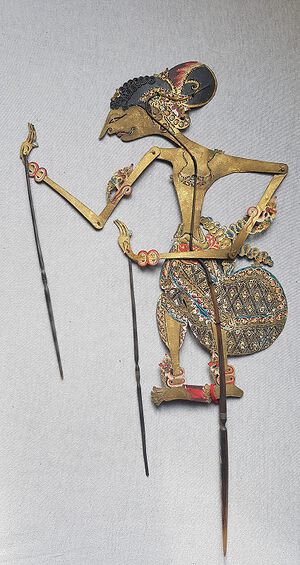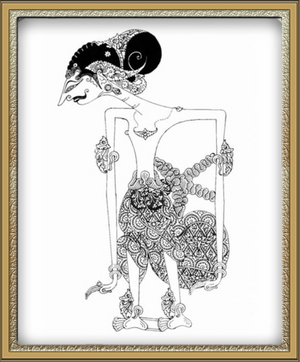Puntadewa - (Wayang Kulit)
| Title | Puntadewa - (Raden) - Mahabharata |
|---|---|
| Other names | ... |
| Size | 45 cm |
| Personal data | Puntadewa was the eldest son of Prabu Pandu Dewanata (king of the Astina Kingdom) and Dewi Kunti. Puntadewa is actually the son of Batara Darma. In wayang, Puntadewa's wife is Dewi Drupadi. |
| Appearance | Puntadewa has a fair and honest nature like Batara Darma. Therefore he got the nickname Ajasatru, meaning someone who has no enemies. Like his brother, as a child, Puntadewa received teachings from Resi Durna and Resi Krepa. However, because Puntadewa inherited Batara Darma's character of always prioritizing truth, justice and humility, he was less interested in soldiering and preferred constitutional science, history and law. |
| Collection | Private collection |
Puntadewa - (Raden) - Mahabharata
In his interactions with the Kauravas, Puntadewa always had a relenting attitude. He never fought back. always avoided disputes, but it was his younger siblings who always defended him, especially Bima and Arjuna.
When King Pandu Dewanata died, the Pandhawa were still small. Puntadewa was also not an adult so he could not be crowned king of the Astina Kingdom. The royal elders then appointed Drestrarastra, Prabu Pandu's older brother, to take over the reins of government in the Astina Kingdom until Pandhawa came of age.
However, Prabu Drestrarastra fell for the persuasion of his wife, Dewi Gendari and his brother-in-law, Patih Sengkuni, so Prabu Drestrarastra appointed his eldest son, Suyudana, as crown prince. King Drestrarastra's consideration was because Pandhawa was reported to have died during the Bale Sigala-Gala incident. Even though Pandhawa and Dewi Kunti are still alive.
Puntadewa founded a kingdom called Amarta in the Wanamarta Forest. The forest was a gift from King Drestrarastra at the suggestion of Resi Bhishma to avoid disputes between the Pandhawa and the Kaurava. The Amarta Kingdom is also known as Indraprasta. The Amarta Kingdom grew into a prosperous, safe and peaceful kingdom.
Even though his attitude to life and behavior are often considered exemplary, Puntadewa also made a very fatal mistake, namely when he accepted the cunning Patih Seungkuni's challenge to play dice gambling. During the game, Puntadewa not only risked money and property, but also the Amarta Kingdom, himself, his brothers, and even his wife.
In that gambling, Puntadewa lost, as a result he lost everything and suffered for thirteen years. At that very moment, the Goddess Draupadi was treated cruelly by Dushasana, so that she took an oath that she would not wear her hair in a bun until it was washed with Dushasana's blood.
Next, the Pandhawa and Goddess Draupadi underwent a period of exile in the forest for twelve years. After that, they hide and disguised themselves in the Virata Kingdom. During his hiding period, Puntadewa disguised himself as a history and state administration expert named Dwijakangka. In the puppetry version, Puntadewa disguises himself as a tandha interpreter or market foreman, so his name is Tanda Dwijakangka.
In the Purwa shadow puppet art, the character Puntadewa is depicted in various wanda. Wanda Panuksma was created by Sri Paku Buwono II in Mataram Kartasura, Wanda Putut was created by Panembahan Senapati. Apart from that, there are still Wanda Miling, Lare and Wanda Deres.
In the enchanting realm of Wayang Kulit, where shadows dance and ancient tales unfold, Puntadewa stands tall as a beacon of righteousness. More than just the eldest son of the Pandavas, he embodies the very essence of Dharma, the cosmic law of justice and morality. This article delves into the compelling narrative of Puntadewa, exploring his unwavering devotion to principle, his tragic struggles, and the enduring lessons embedded within his journey.
Born for Greatness
Often depicted with a noble demeanor and flowing white attire, Puntadewa's lineage itself signifies his destiny. Born under the celestial influence of Yama, the god of justice, he is destined to uphold righteousness throughout his life. His journey is intricately woven with challenges that test his commitment to Dharma, each one shaping him into a leader of unparalleled integrity and wisdom.
The Burden of Righteousness
Puntadewa faces trials unlike any other. He is renowned for his truthfulness and fairness, even in the face of deceit and manipulation. The infamous game of dice symbolizes his greatest struggle, forced to wager his kingdom and brothers due to his adherence to truth. Yet, even in his downfall, he maintains his dignity and unwavering faith in Dharma, offering a powerful lesson in staying true to one's values even in the face of adversity.
The Power of Leadership
Despite his trials, Puntadewa remains the guiding light for his brothers. He leads them through exile, injustice, and ultimately, victory, inspiring them through his unwavering commitment to their shared goals. His leadership extends beyond his kin, earning the respect and trust of allies and even his adversaries. Through his words and actions, he demonstrates the true meaning of leadership: serving justice, upholding morals, and inspiring others to do the same.
Symbolism and Complexity
Puntadewa's white attire signifies purity and righteousness, while his association with the color blue represents wisdom and truth. He holds the Yudhisthira dagger, symbolizing his power and responsibility. However, Puntadewa is not without flaws. His adherence to his ideals can sometimes lead to naivety or even harshness. This complexity makes him a relatable and thought-provoking character, reminding us that even the most righteous struggle with navigating the gray areas of life.
Beyond the Shadow Stage
The influence of Puntadewa extends far beyond the Wayang stage. He is a revered figure in Indonesian culture, inspiring literature, art, and even contemporary discussions on ethics and leadership. His enduring popularity highlights the universal yearning for justice and the enduring relevance of his values in modern life.


